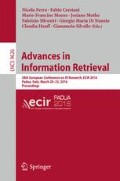Abstract
We explain a wide range of search evaluation metrics as the ratio of users’ gain to effort for interacting with a ranked list of results. According to this explanation, many existing metrics measure users’ effort as linear to the (expected) number of examined results. This implicitly assumes that users spend the same effort to examine different results. We adapt current metrics to account for different effort on relevant and non-relevant documents. Results show that such adaptive effort metrics better correlate with and predict user perceptions on search quality.
Access this chapter
Tax calculation will be finalised at checkout
Purchases are for personal use only
Notes
- 1.
The dataset and source code for replicating our experiments can be accessed at https://github.com/jiepujiang/ir_metrics/.
References
Carterette, B.: System effectiveness, user models, and user utility: a conceptual framework for investigation. In: SIGIR 2011, pp. 903–912 (2011)
Chapelle, O., Metlzer, D., Zhang, Y., Grinspan, P.: Expected reciprocal rank for graded relevance. In: CIKM 2009, pp. 621–630 (2009)
Cooper, W.S.: Expected search length: a single measure of retrieval effectiveness based on the weak ordering action of retrieval systems. Am. Documentation 19(1), 30–41 (1968)
De Vries, A.P., Kazai, G., Lalmas, M.: Tolerance to irrelevance: a user-effort oriented evaluation of retrieval systems without predefined retrieval unit. RIAO 2004, 463–473 (2004)
Dunlop, M.D.: Time, relevance and interaction modelling for information retrieval. In: SIGIR 1997, pp. 206–213 (1997)
Järvelin, K., Kekäläinen, J.: Cumulated gain-based evaluation of IR techniques. ACM Trans. Inf. Syst. 20(4), 422–446 (2002)
Järvelin, K., Price, S.L., Delcambre, L.M.L., Nielsen, M.L.: Discounted cumulated gain based evaluation of multiple-query IR sessions. In: Macdonald, C., Ounis, I., Plachouras, V., Ruthven, I., White, R.W. (eds.) ECIR 2008. LNCS, vol. 4956, pp. 4–15. Springer, Heidelberg (2008)
Jiang, J., Hassan Awadallah, A., Shi, X., White, R.W.: Understanding and predicting graded search satisfaction. In: WSDM 2015. pp. 57–66 (2015)
Jiang, J., He, D., Allan, J.: Searching, browsing, and clicking in a search session: Changes in user behavior by task and over time. In: SIGIR 2014, pp. 607–616 (2014)
Kanoulas, E., Carterette, B., Clough, P.D., Sanderson, M.: Evaluating multi-query sessions. In: SIGIR 2011, pp. 1053–1062 (2011)
Kazai, G., Lalmas, M.: Extended cumulated gain measures for the evaluation of content-oriented xml retrieval. ACM Trans. Inf. Syst. 24(4), 503–542 (2006)
Kelly, D., Belkin, N.J.: Display time as implicit feedback: Understanding task effects. In: SIGIR 2004, pp. 377–384 (2004)
Moffat, A., Zobel, J.: Rank-biased precision for measurement of retrieval effectiveness. ACM Trans. Inf. Syst. 27(1), 2:1–2:27 (2008)
Robertson, S.E.: A new interpretation of average precision. In: SIGIR 2008, pp. 689–690 (2008)
Robertson, S.E., Kanoulas, E., Yilmaz, E.: Extending average precision to graded relevance judgments. In: SIGIR 2010, pp. 603–610 (2010)
Sakai, T., Dou, Z.: Summaries, ranked retrieval and sessions: a unified framework for information access evaluation. In: SIGIR 2013, pp. 473–482, (2013)
Smucker, M.D., Clarke, C.L.: Time-based calibration of effectiveness measures. In: SIGIR 2012, pp. 95–104(2012)
Smucker, M.D., Jethani, C.P.: Human performance and retrieval precision revisited. In: SIGIR 2010, pp. 595–602 (2010)
Villa, R., Halvey, M.: Is relevance hard work?: Evaluating the effort of making relevant assessments. In: SIGIR 2013, pp. 765–768 (2013)
Yilmaz, E., Shokouhi, M., Craswell, N., Robertson, S.E.: Expected browsing utility for web search evaluation. In: CIKM 2010, pp. 1561–1564 (2010)
Yilmaz, E., Verma, M., Craswell, N., Radlinski, F., Bailey, P.: Relevance and effort: an analysis of document utility. In: CIKM 2014, pp. 91–100 (2014)
Acknowledgment
This work was supported in part by the Center for Intelligent Information Retrieval and in part by NSF grant #IIS-0910884. Any opinions, findings and conclusions or recommendations expressed in this material are those of the authors and do not necessarily reflect those of the sponsor.
Author information
Authors and Affiliations
Corresponding author
Editor information
Editors and Affiliations
Rights and permissions
Copyright information
© 2016 Springer International Publishing Switzerland
About this paper
Cite this paper
Jiang, J., Allan, J. (2016). Adaptive Effort for Search Evaluation Metrics. In: Ferro, N., et al. Advances in Information Retrieval. ECIR 2016. Lecture Notes in Computer Science(), vol 9626. Springer, Cham. https://doi.org/10.1007/978-3-319-30671-1_14
Download citation
DOI: https://doi.org/10.1007/978-3-319-30671-1_14
Publisher Name: Springer, Cham
Print ISBN: 978-3-319-30670-4
Online ISBN: 978-3-319-30671-1
eBook Packages: Computer ScienceComputer Science (R0)

